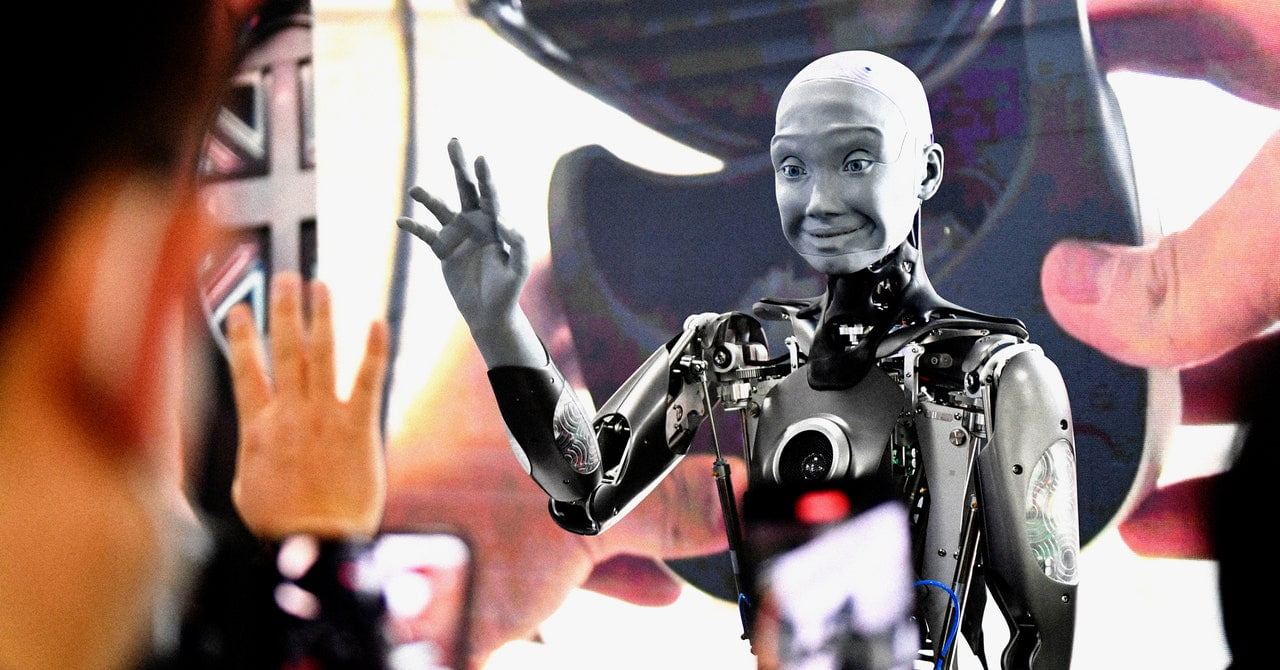
If you’re waiting for the hubbub over generative AI to die down, maybe pull up a chair. The buzz around artificial intelligence shows no signs of quieting—a fact that will become all too obvious at this year’s CES.
CES, the consumer electronics industry’s largest annual gathering in the US, is returning to Las Vegas on January 9. It is a massive, four-day-long bustling bazaar of tech, with expo halls filled to the brim with new gadgets, hopeful startups, and prototypes that reach for the stars. CES is a trade show where sales and distribution deals are inked, where concept cars roll through crowded streets, and where tech journalists and showgoers alike wander the floors looking for the standout new products. And this year, many of the products debuting are going to be garnished with heaping globs of AI.
For years, generative AI technology bubbled beneath the surface of public consciousness. It finally burst into the limelight in November 2022, when OpenAI released the first iteration of ChaptGPT. The arrival of the shiny new chatbot kicked off an AI arms race. Since the reverberant waves of this eruption hadn’t yet fully saturated the tech industry by the time last year’s CES took place, there wasn’t really a whole lot of GenAI talk in Las Vegas last January. As a result, CES 2023 looks almost primitive in hindsight, arriving a scant six weeks behind the greatest technological revolution since the mobile phone.
That won’t be the case in 2024. “We didn’t get the full CES fire hose of AI announcements last year like we’re going to have,” says Anshel Sag, a principal analyst at Moor Insights & Strategy. “If you thought it was a wave last year, it’s going to be a tsunami this year.”
Expect to see AI everywhere at CES: in cars, scooters, headphones, cameras, speakers, and televisions. In some cases, these products will simply include another way to access a ChatGPT-style question-and-response service to handle spoken commands. But in other cases, the advances could feel more impactful. Companies like Intel, Qualcomm, and AMD are expected to announce chips that support AI services on the devices that carry them. These chips would process AI tasks locally, without having to send a request to a server in the cloud and then wait for a response, making things like computer vision, voice-to-text services, and generative computing feel snappier.
CES is where the narrative around industry trends is shaped. Sag says that’s what’s likely to happen with the abundance of AI this CES. “AI is just going to overwhelm everything,” Sag says. “It will be so prevalent and so dominant that some people will just be sick of it.”
Gary Shapiro, CEO of the Consumer Technology Association, the group that puts on CES, says that while artificial intelligence capabilities may be heralded this year, the tech will eventually fade into the background as it becomes commonplace.
“AI is almost like the internet; it’s a huge ingredient that’s not going away,” Shapiro says. “Companies don’t go to CES and say, ‘Here’s the internet.’ It’ll be interesting to see how they implement generative AI.”
While computer chips that imitate human interactions may be the big stars of CES, AI is far from the only trend to watch for at the event.
The automotive industry won’t steal as much of the focus as it did in recent years, but companies like Honda have teased plans to reveal new electric vehicles at CES. Health tech will also be emphasized more heavily, and beauty tech featured at the forefront for the first time in CES history, with a keynote address from the French personal care company L’Oréal. Sag also says to expect a renewed vigor around extended reality tech, as companies aim to either prepare for Apple’s Vision Pro headset or compete with it.
If you’re going this year, you can expect CES to be as crowded and noisy as ever, with every company exhibiting there hoping to get some attention (and revenue) from their tech announcements—even if all they’re doing is putting a new chip in an already familiar device to make it a little chattier, and a little more human.
Prepare for an Abundance of AI at CES
The Consumer Electronics Show (CES) is one of the most anticipated events in the tech industry, showcasing the latest innovations and trends. In recent years, one trend that has dominated CES is the proliferation of Artificial Intelligence (AI) technology. From smart home devices to autonomous vehicles, AI has become an integral part of our daily lives, and CES is the perfect platform to witness its advancements.
AI has made significant strides in recent years, transforming industries and revolutionizing the way we interact with technology. CES provides a glimpse into the future, where AI-powered devices are seamlessly integrated into our homes, workplaces, and even our cars. As we prepare for CES, it’s essential to understand the impact AI will have on our lives and how to make the most of this abundance of AI.
One area where AI has made a significant impact is in the smart home industry. CES showcases a wide range of AI-powered devices that can automate various tasks and enhance our living spaces. From voice-activated assistants like Amazon’s Alexa and Google Assistant to smart appliances and security systems, AI is making our homes more intelligent and convenient. At CES, attendees can explore the latest advancements in smart home technology and learn how to create a connected ecosystem within their homes.
Another area where AI is gaining traction is in the automotive industry. CES has become a hub for showcasing autonomous vehicles and AI-powered driving assistance systems. From self-driving cars to advanced driver-assistance systems (ADAS), AI is transforming the way we commute and travel. At CES, attendees can witness demonstrations of autonomous vehicles and learn about the latest developments in AI-driven transportation.
AI is not limited to just smart homes and autonomous vehicles; it has also found its way into healthcare, entertainment, and even retail. CES offers a platform for companies to showcase AI-powered solutions that improve patient care, enhance gaming experiences, and personalize shopping experiences. From virtual reality (VR) and augmented reality (AR) applications to AI-powered robots and chatbots, CES is a treasure trove of AI innovations.
To make the most of the abundance of AI at CES, attendees should come prepared. Researching and familiarizing oneself with the latest AI trends and products before attending the event can help navigate through the vast array of offerings. It’s also essential to prioritize and plan which areas of AI interest you the most, as CES can be overwhelming with its sheer scale and diversity.
Attending presentations, panel discussions, and workshops focused on AI can provide valuable insights into the future of this technology. Engaging with industry experts and networking with like-minded individuals can lead to fruitful discussions and collaborations. CES offers a unique opportunity to connect with innovators and thought leaders in the AI space.
Lastly, it’s crucial to keep an open mind and embrace the possibilities that AI brings. As AI continues to evolve, it will undoubtedly disrupt industries and create new opportunities. CES serves as a platform to witness these advancements firsthand and gain a deeper understanding of how AI will shape our future.
In conclusion, CES is an event that showcases the abundance of AI in various industries. From smart homes to autonomous vehicles, AI has become an integral part of our lives, and CES provides a glimpse into its advancements. To make the most of this abundance of AI at CES, attendees should come prepared, research the latest trends, prioritize their interests, attend relevant presentations, and keep an open mind. CES offers a unique opportunity to witness the future of AI and its impact on our daily lives.






